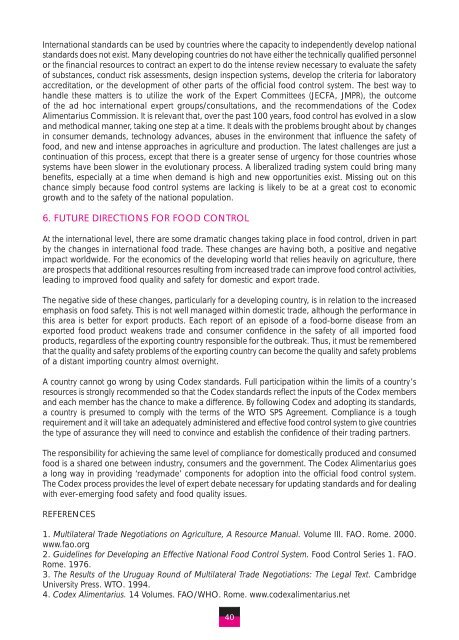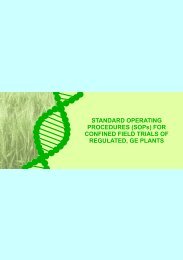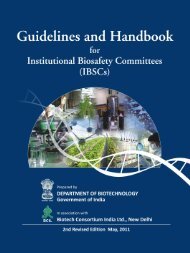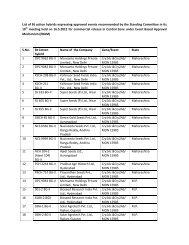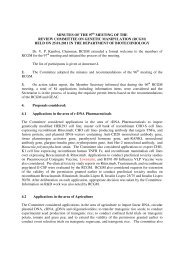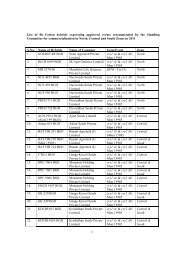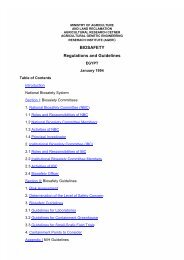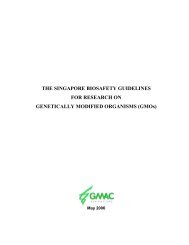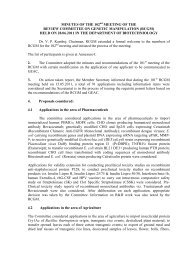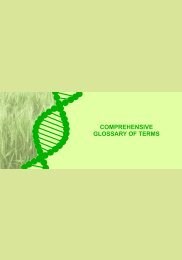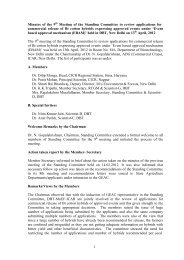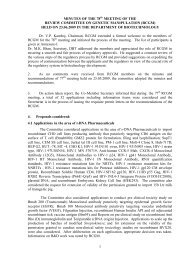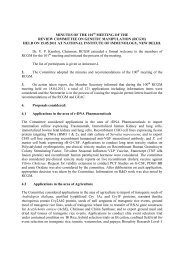THE USER'S MANUAL ON CODEX - Department of Biotechnology
THE USER'S MANUAL ON CODEX - Department of Biotechnology
THE USER'S MANUAL ON CODEX - Department of Biotechnology
Create successful ePaper yourself
Turn your PDF publications into a flip-book with our unique Google optimized e-Paper software.
International standards can be used by countries where the capacity to independently develop national<br />
standards does not exist. Many developing countries do not have either the technically qualified personnel<br />
or the financial resources to contract an expert to do the intense review necessary to evaluate the safety<br />
<strong>of</strong> substances, conduct risk assessments, design inspection systems, develop the criteria for laboratory<br />
accreditation, or the development <strong>of</strong> other parts <strong>of</strong> the <strong>of</strong>ficial food control system. The best way to<br />
handle these matters is to utilize the work <strong>of</strong> the Expert Committees (JECFA, JMPR), the outcome<br />
<strong>of</strong> the ad hoc international expert groups/consultations, and the recommendations <strong>of</strong> the Codex<br />
Alimentarius Commission. It is relevant that, over the past 100 years, food control has evolved in a slow<br />
and methodical manner, taking one step at a time. It deals with the problems brought about by changes<br />
in consumer demands, technology advances, abuses in the environment that influence the safety <strong>of</strong><br />
food, and new and intense approaches in agriculture and production. The latest challenges are just a<br />
continuation <strong>of</strong> this process, except that there is a greater sense <strong>of</strong> urgency for those countries whose<br />
systems have been slower in the evolutionary process. A liberalized trading system could bring many<br />
benefits, especially at a time when demand is high and new opportunities exist. Missing out on this<br />
chance simply because food control systems are lacking is likely to be at a great cost to economic<br />
growth and to the safety <strong>of</strong> the national population.<br />
6. FUTURE DIRECTI<strong>ON</strong>S FOR FOOD C<strong>ON</strong>TROL<br />
At the international level, there are some dramatic changes taking place in food control, driven in part<br />
by the changes in international food trade. These changes are having both, a positive and negative<br />
impact worldwide. For the economics <strong>of</strong> the developing world that relies heavily on agriculture, there<br />
are prospects that additional resources resulting from increased trade can improve food control activities,<br />
leading to improved food quality and safety for domestic and export trade.<br />
The negative side <strong>of</strong> these changes, particularly for a developing country, is in relation to the increased<br />
emphasis on food safety. This is not well managed within domestic trade, although the performance in<br />
this area is better for export products. Each report <strong>of</strong> an episode <strong>of</strong> a food-borne disease from an<br />
exported food product weakens trade and consumer confidence in the safety <strong>of</strong> all imported food<br />
products, regardless <strong>of</strong> the exporting country responsible for the outbreak. Thus, it must be remembered<br />
that the quality and safety problems <strong>of</strong> the exporting country can become the quality and safety problems<br />
<strong>of</strong> a distant importing country almost overnight.<br />
A country cannot go wrong by using Codex standards. Full participation within the limits <strong>of</strong> a country’s<br />
resources is strongly recommended so that the Codex standards reflect the inputs <strong>of</strong> the Codex members<br />
and each member has the chance to make a difference. By following Codex and adopting its standards,<br />
a country is presumed to comply with the terms <strong>of</strong> the WTO SPS Agreement. Compliance is a tough<br />
requirement and it will take an adequately administered and effective food control system to give countries<br />
the type <strong>of</strong> assurance they will need to convince and establish the confidence <strong>of</strong> their trading partners.<br />
The responsibility for achieving the same level <strong>of</strong> compliance for domestically produced and consumed<br />
food is a shared one between industry, consumers and the government. The Codex Alimentarius goes<br />
a long way in providing ‘readymade’ components for adoption into the <strong>of</strong>ficial food control system.<br />
The Codex process provides the level <strong>of</strong> expert debate necessary for updating standards and for dealing<br />
with ever-emerging food safety and food quality issues.<br />
REFERENCES<br />
1. Multilateral Trade Negotiations on Agriculture, A Resource Manual. Volume III. FAO. Rome. 2000.<br />
www.fao.org<br />
2. Guidelines for Developing an Effective National Food Control System. Food Control Series 1. FAO.<br />
Rome. 1976.<br />
3. The Results <strong>of</strong> the Uruguay Round <strong>of</strong> Multilateral Trade Negotiations: The Legal Text. Cambridge<br />
University Press. WTO. 1994.<br />
4. Codex Alimentarius. 14 Volumes. FAO/WHO. Rome. www.codexalimentarius.net<br />
40


